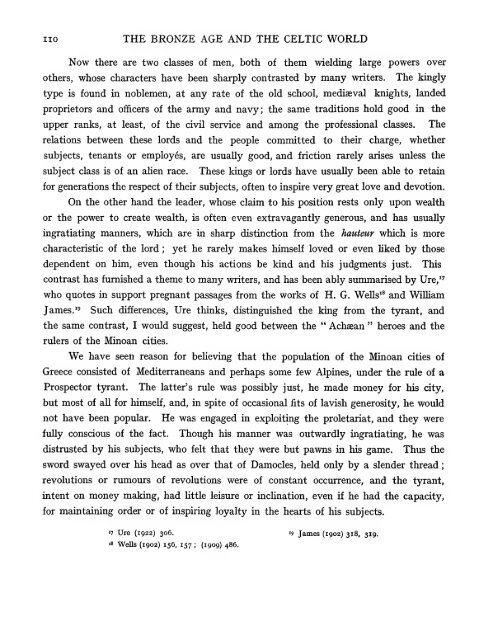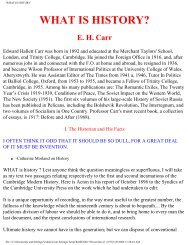The bronze age and the Celtic world - Universal History Library
The bronze age and the Celtic world - Universal History Library
The bronze age and the Celtic world - Universal History Library
You also want an ePaper? Increase the reach of your titles
YUMPU automatically turns print PDFs into web optimized ePapers that Google loves.
no THE BRONZE AGE AND THE CELTIC WORLD<br />
Now <strong>the</strong>re are two classes of men, both of <strong>the</strong>m wielding large powers over<br />
o<strong>the</strong>rs, whose characters have been sharply contrasted by many writers. <strong>The</strong> kingly<br />
type is found in noblemen, at any rate of <strong>the</strong> old school, mediaeval knights, l<strong>and</strong>ed<br />
proprietors <strong>and</strong> officers of <strong>the</strong> army <strong>and</strong> navy; <strong>the</strong> same traditions hold good in <strong>the</strong><br />
upper ranks, at least, of <strong>the</strong> civil service <strong>and</strong> among <strong>the</strong> professional classes. <strong>The</strong><br />
relations between <strong>the</strong>se lords <strong>and</strong> <strong>the</strong> people committed to <strong>the</strong>ir charge, whe<strong>the</strong>r<br />
subjects, tenants or employes, are usually good, <strong>and</strong> friction rarely arises unless <strong>the</strong><br />
subject class is of an alien race. <strong>The</strong>se kings or lords have usually been able to retain<br />
for generations <strong>the</strong> respect of <strong>the</strong>ir subjects, often to inspire very great love <strong>and</strong> devotion.<br />
On <strong>the</strong> o<strong>the</strong>r h<strong>and</strong> <strong>the</strong> leader, whose claim to his position rests only upon wealth<br />
or <strong>the</strong> power to create wealth, is often even extravagantly generous, <strong>and</strong> has usually<br />
ingratiating manners, which are in sharp distinction from <strong>the</strong> hauteur which is more<br />
characteristic of <strong>the</strong> lord ; yet he rarely makes himself loved or even liked by those<br />
dependent on him, even though his actions be kind <strong>and</strong> his judgments just. This<br />
contrast has furnished a <strong>the</strong>me to many writers, <strong>and</strong> has been ably summarised by Ure,''<br />
who quotes in support pregnant pass<strong>age</strong>s from <strong>the</strong> works of H. G. Wells'* <strong>and</strong> William<br />
James. '5 Such differences, Ure thinks, distinguished <strong>the</strong> king from <strong>the</strong> tyrant, <strong>and</strong><br />
<strong>the</strong> same contrast, I would suggest, held good between <strong>the</strong> " Achaean " heroes <strong>and</strong> <strong>the</strong><br />
rulers of <strong>the</strong> Minoan cities.<br />
We have seen reason for believing that <strong>the</strong> population of <strong>the</strong> Minoan cities of<br />
Greece consisted of Mediterraneans <strong>and</strong> perhaps some few Alpines, under <strong>the</strong> rule of a<br />
Prospector tyrant. <strong>The</strong> latter's rule was possibly just, he made money for his city,<br />
but most of all for himself, <strong>and</strong>, in spite of occasional fits of lavish generosity, he would<br />
not have been popular. He was eng<strong>age</strong>d in exploiting <strong>the</strong> proletariat, <strong>and</strong> <strong>the</strong>y were<br />
fully conscious of <strong>the</strong> fact. Though his manner was outwardly ingratiating, he was<br />
distrusted by his subjects, who felt that <strong>the</strong>y were but pawns in his game. Thus <strong>the</strong><br />
sword swayed over his head as over that of Damocles, held only by a slender thread<br />
revolutions or rumours of revolutions were of constant occurrence, <strong>and</strong> <strong>the</strong> tyrant,<br />
intent on money making, had Uttle leisure or incUnation, even if he had <strong>the</strong> capacity,<br />
for maintaining order or of inspiring loyalty in <strong>the</strong> hearts of his subjects.<br />
'7 Ure (1922) 306. 19 James (1902) 318, 319.<br />
«8 Wells (1902) 156, 157 ; (1909) 486.<br />
;







